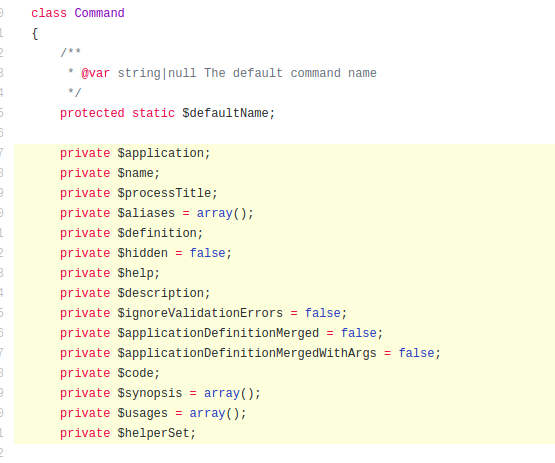How to Get PHP 7.4 Typed Properties to Your Code in Few Seconds
What is new?
Switch from deprecated --set option to rector.php config.
PHP 5.6 and 7.0 is going to be dangerous since 2019, PHP 7.1 is new baseline and PHP 7.3 is just about to be released in the end of 2018.
Is this the best time to upgrade your code to PHP 7.4?
Yes, because PHP 7.4 was released 2 years ago.
Can @var Annotations be Useful?
Annotations were always in the bottom, ashamed and not considered a real code. They help us to guess the type of the property. Not only to us, but also to static analysis tools.
final class SomeClass
{
/**
* @var int
*/
private $count;
}
Here we can see that $count is an int number.
In PHP 7.4 we could change this code to get a strict typing:
<?php declare(strict_types=1);
final class SomeClass
{
- /**
- * @var int
- */
- private $count;
+ private int $count;
}
When you write @var annotation today, you'll be preparing your code for future refactoring. You might laugh now: "everyone is doing that today, why do you even write about this obvious standard".
Well, not everyone...

This is my favorite class to extend in whole Symfony - a Command class.
This is Symfony 4.2 (dev) we're talking about with PHP 7.1+. Lot's of Symfony code is weakly not typed, but that's not the biggest problem.
"My-favorite-framework Uses It, It must be the Best Practise in PHP!"
The problem is framework-way approach to learning PHP. Many developers I've met think their framework uses the best practices of the PHP itself. Why? Have you ever tried to learn some other PHP framework than the one you're using today? I mean learn, not just try on the workshop, during the weekend, but to really build a big application with it.
Saying that, many developers adopt Symfony practices thinking it the best form of PHP there is. There's no place to blame developers, it's just how society works - with observational learning. We should not blame Symfony either since there is no code quality engineer, who would push non-feature code changes. Unfortunately, Symfony team itself is strictly against these changes as you can see in PR comments.
Recently I'm very happy to see these engineers around me - LMC to name one for all.
Visualize Future Compatibility
When you code, think about the way to write future compatible code. What is happening in PHP for the last 2-3 years? Type hints, ?nullables, void, AST and static analysis suggest, there is more coming. I wouldn't be surprised if these annotations turn out to be useful in pure PHP one day:
<?php
final class SomeClass
{
/**
* @var int
*/
private const NUMBER = 5;
/**
* @var Product[]
*/
private $products = [];
}
In PHP 8 or 9 this might come:
<?php declare(strict_types=1);
final class SomeClass
{
- /**
- * @var int
- */
- private const NUMBER = 5;
+ private const int NUMBER = 5;
- /**
- * @var Product[]
- */
- private $products = [];
+ private Product[] $products = [];
}
In PHP Asia, typed arrays was the most desired feature in next versions of PHP. So were typed properties once and so were strict types before them. In 2015 we would only dream about those 2, now one is part of our every-day life, second coming soon.
##"...in Seconds"
Yeah, right, I made a promise - I'll get back to nearer future with typed properties.
Let's say we're thinking about the future and adding all @var annotations we can. Is that enough? You'd still have to do these diffs manually:
<?php declare(strict_types=1);
final class SomeClass
{
- /**
- * @var boolean
- */
- public $a;
+ public bool $a;
/**
- * @var bool
* another comment
*/
- private $b = false;
+ private bool $b = false;
/**
* @var callable
*/
private $c;
- /**
- * @var AnotherClass|null
- */
- private $d = null;
+ private ?AnotherClass $d = null;
/**
* @var int
*/
public $e = 'string';
}
Or you could be actually rewarded for your daunting @var work. Good news! Rector handles this for you.
3 Steps to Add Typed Properties to your code With Rector
- Install Rector
composer require rector/rector --dev
- Add
rector.phpconfig withTypedPropertyRectorRule
use Rector\Php74\Rector\Property\TypedPropertyRector;
use Rector\Config\RectorConfig;
return function (RectorConfig $rectorConfig): void {
$rectorConfig->ruleWithConfiguration(TypedPropertyRector::class, [
TypedPropertyRector::INLINE_PUBLIC => true,
]);
};
- Run Rector
vendor/bin/rector process src
I started this post to show how Rector helps with huge refactorings like @var annotations to types that are about to come next year. But the message is far being that - observing trends, seeing the future and working towards that.
How To Make Your Future-Self Happy?
- write
@varabove each property - write
@varor any other@valueinfo above each constant - write
@var Type[]above each array property- not
mixed, notobject, but scalar or specific class or interface
- not
- think about rules in your code that you've non-critically copy-pasted from the framework
You're saving work to yourself, to your colleagues and to tools like Rector, that will do the work for you. If you're ready...
Do you have some own future compatibility tips you use in your code today? I'd love to hear them ↓